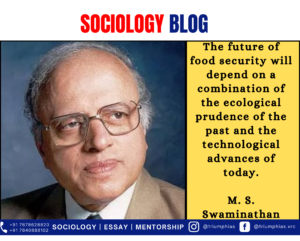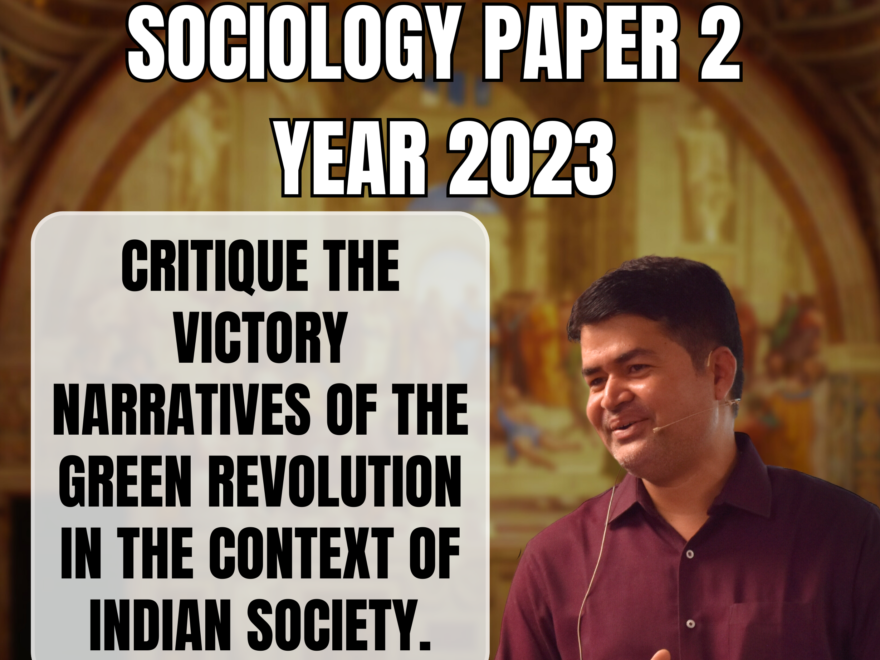Critique the victory narratives of the Green Revolution in the context of Indian society.
Section: A.
Sociology Paper 2023 Analysis.
Relevant for Paper 2: Unit-13 Rural and Agrarian Transformation in India : Green Revolution and Social Change

Question 4 (c): Critique the victory narratives of the Green Revolution in the context of Indian society.
(10 Marks)
|
Introduction: Brief About the Green Revolution Main Body: Briefly Explain the Victory Narrative of Green Revolution and then Present the Limitations and Negative Consequences Highlighting Inequality , Domestication of Women , Environmental and Health Hazards etc. Conclusion: Gaol Attainment of Evergreen Revolution with Mitigating the Negatives of Green Revolution |
Introduction:
The Green Revolution aimed to increase food production through the adoption of high-yield variety seeds, modern agricultural practices, and government subsidies. It led to a significant rise in agricultural productivity and contributed to food self-sufficiency in India. However, the narrative of success masks the profound socio-economic disparities and environmental challenges it brought about.
Main body:
The victory narrative :
- Increased Food Production: The Green Revolution undeniably succeeded in boosting food production, particularly of wheat and rice. Hanumantha Rao stated that resulted in greater food security for the country’s burgeoning population.
- Improved Living Standards: According to T. K. Oommen green revolution resulted in increased rural employment and poverty decline in rural areas. The economic transformation in rural areas brought about an increase in living standards. Households acquired appliances and enjoyed improved access to education and healthcare, fostering social mobility.
- Technological Advancement: The Green Revolution introduced modern agricultural technologies, which paved the way for further innovations and mechanization in the agricultural sector.
The gaps highlighted in victory narrative as follows
- Social Inequality: Daniel Thorner argues that the Green Revolution exacerbated social and economic inequalities, as green revolution did not help poor as there is strong linkage between the caste and classes in context of appropriating the benefits of green revolution . The benefits were largely concentrated in the hands of dominant castes and big farmers, further marginalizing the vulnerable sections of society.
- Domestication of women: Utsa Patnaik highlighted that women removed from the labour and glorification of gendered expressive role of women has exacerbated and also it has led to issue of missing women due to sex selective abortions. Nivedita Menon has attributed the feminisation of poverty to green revolution .
- Marginalization of Small Farmers: Utsa Patnaik criticizes the Green Revolution for its negative impact on small and marginal farmers. They could not afford the high costs of modern inputs and machinery, leading to increased indebtedness.
- Environmental Degradation : the environmental consequences of the Green Revolution includes the depletion of groundwater and the loss of biodiversity. These issues pose long-term challenges for sustainable development.
- Structural Problems Unaddressed: Gail Omvedt points out that the Green Revolution failed to address the underlying structural problems of Indian agriculture, such as landlessness and the exploitation of agricultural labor. These issues persist today.
- Vandana Shiva highlight that that first green revolution initiated a process of second green revolution which is driven by multinational and private interests . It made agriculture a costly and unsustainable affair .
- Loss of Biodiversity: Vandana Shiva argues that the Green Revolution led to the destruction of traditional farming systems and the loss of biodiversity. It also contributed to the overuse of chemical fertilizers and pesticides, causing further environmental harm.
- Social and Cultural Impacts: The Green Revolution promoted materialism and consumerism, leading to a rise in relative deprivation and social issues like substance abuse and prostitution.
-
- Ashok Rudra the Green Revolution for its focus on high-yielding varieties of crops, which require large amounts of chemical fertilizers and pesticides, leading to environmental degradation and health hazards.
- Additionally, it led to a decline in religiosity and traditional values, causing social tension, as seen in the rise of cults like Bhindranwale in Punjab.
Conclusion:
It is essential to transition from the Green Revolution to an Evergreen Revolution as highlighted by M. S. Swaminathan . This shift should focus on sustainable farming practices, conserving biodiversity, and addressing socio-economic disparities.
Related Blogs…
 |
 |

To master these intricacies and fare well in the Sociology Optional Syllabus, aspiring sociologists might benefit from guidance by the Best Sociology Optional Teacher and participation in the Best Sociology Optional Coaching. These avenues provide comprehensive assistance, ensuring a solid understanding of sociology’s diverse methodologies and techniques.
META TAGS: A Contextualize Louis Dumonts concept of binary opposition, A Contextualize Louis Dumonts concept of binary opposition, A Contextualize Louis Dumonts concept of binary opposition, A Contextualize Louis Dumonts concept of binary opposition, A Contextualize Louis Dumonts concept of binary opposition, A Contextualize Louis Dumonts concept of binary opposition, A Contextualize Louis Dumonts concept of binary opposition, A Contextualize Louis Dumonts concept of binary opposition
Why Vikash Ranjan’s Classes for Sociology?
Proper guidance and assistance are required to learn the skill of interlinking current happenings with the conventional topics. VIKASH RANJAN SIR at TRIUMPH IAS guides students according to the Recent Trends of UPSC, making him the Best Sociology Teacher for Sociology Optional UPSC.
At Triumph IAS, the Best Sociology Optional Coaching platform, we not only provide the best study material and applied classes for Sociology for IAS but also conduct regular assignments and class tests to assess candidates’ writing skills and understanding of the subject.
Choose The Best Sociology Optional Teacher for IAS Preparation?
At the beginning of the journey for Civil Services Examination preparation, many students face a pivotal decision – selecting their optional subject. Questions such as “which optional subject is the best?” and “which optional subject is the most scoring?” frequently come to mind. Choosing the right optional subject, like choosing the best sociology optional teacher, is a subjective yet vital step that requires a thoughtful decision based on facts. A misstep in this crucial decision can indeed prove disastrous.
Ever since the exam pattern was revamped in 2013, the UPSC has eliminated the need for a second optional subject. Now, candidates have to choose only one optional subject for the UPSC Mains, which has two papers of 250 marks each. One of the compelling choices for many has been the sociology optional. However, it’s strongly advised to decide on your optional subject for mains well ahead of time to get sufficient time to complete the syllabus. After all, most students score similarly in General Studies Papers; it’s the score in the optional subject & essay that contributes significantly to the final selection.
“A sound strategy does not rely solely on the popular
Opinion of toppers or famous YouTubers cum teachers.”
It requires understanding one’s ability, interest, and the relevance of the subject, not just for the exam but also for life in general. Hence, when selecting the best sociology teacher, one must consider the usefulness of sociology optional coaching in General Studies, Essay, and Personality Test.
The choice of the optional subject should be based on objective criteria, such as the nature, scope, and size of the syllabus, uniformity and stability in the question pattern, relevance of the syllabic content in daily life in society, and the availability of study material and guidance. For example, choosing the best sociology optional coaching can ensure access to top-quality study materials and experienced teachers. Always remember, the approach of the UPSC optional subject differs from your academic studies of subjects. Therefore, before settling for sociology optional, you need to analyze the syllabus, previous years’ pattern, subject requirements (be it ideal, visionary, numerical, conceptual theoretical), and your comfort level with the subject.
This decision marks a critical point in your UPSC – CSE journey, potentially determining your success in a career in IAS/Civil Services. Therefore, it’s crucial to choose wisely, whether it’s the optional subject or the best sociology optional teacher. Always base your decision on accurate facts, and never let your emotional biases guide your choices. After all, the search for the best sociology optional coaching is about finding the perfect fit for your unique academic needs and aspirations.
Follow us :
🔎 https://www.instagram.com/triumphias
🔎 https://www.youtube.com/c/TriumphIAS
🔎 https://t.me/VikashRanjanSociology
Find More Blogs…
| Compare and contrast Karl Marx’s and Max weber’s | Karl Marx- Historical Materialism |
| Position of Women In the Modern Indian Society | Sociology: Social system and pattern variables |
Keywords: Green Revolution in the context of Indian society, Green Revolution in the context of Indian society, Green Revolution in the context of Indian society, Green Revolution in the context of Indian society, Green Revolution in the context of Indian society, Green Revolution in the context of Indian society, Green Revolution in the context of Indian society, Green Revolution in the context of Indian society, Green Revolution in the context of Indian society, Green Revolution in the context of Indian society, Green Revolution in the context of Indian society, Green Revolution in the context of Indian society, Green Revolution in the context of Indian society,



